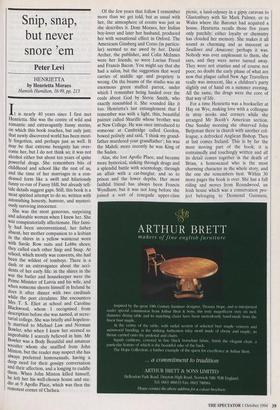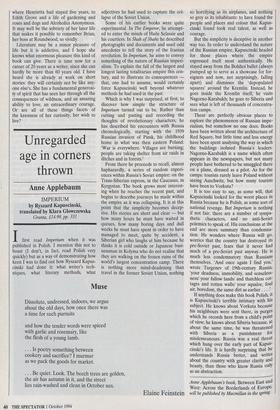Snip, snap, but never snore 'em
Peter Levi
HENRIETTA by Henrietta Moraes Hamish Hamilton, 16.99, pp. 213 It is nearly 40 years since I first met Henrietta. She was the centre of wild and romantic and extravagantly funny stories, on which this book touches, but only just; that newly discovered world has been most- ly forgotten, and perhaps just as well. It may be that extreme benignity has over- come her, but I do not think so; it was not alcohol either but about ten years of quite powerful drugs. She remembers bits of childhood and school like the rest of us, and the time of her marriages in a con- densed form like a swift and hilariously funny re-run of Fanny Hill, but already tell- tale details suggest gaps. Still, this book is a most spirited attempt to do so, written with astonishing honesty, humour, and mysteri- ously surviving innocence.
She was the most generous, surprising and adorable woman when I knew her. She was conspiratorially affectionate. Her fami- ly had been unconventional, her father absent, her mother companion to a lesbian in the shires in a yellow waistcoat worn with Savile Row suits and Lobbs shoes; they called each other Snip and Snap. At school, which mostly was convents, she had been the wildest of tomboys. There is a dash or an extravagance about the acci- dents of her early life: in the shires in the war the butler and housekeeper were the Prime Minister of Latvia and his wife, and when someone shoots himself in Ireland he does it after dinner with two cardinals while the port circulates. She encounters Mrs T. S. Eliot at school and Caroline Blackwood, whom I recognised from description before she was named, at secre- tarial college. She was briefly and hopeless- ly married to Michael Law and Norman Bowler, who when I knew her seemed so improbable I scarcely believed in him. Mr Bowler was a Body Beautiful and amateur wrestler whom she snaffled from John Minton, but the reader may suspect she has always preferred homosexuals, having a deep need for their gossipy conversation and their affection, and a longing to cuddle them. When John Minton killed himself, he left her his well-chosen house and stu- dio at 9 Apollo Place, which was then the remotest corner of Chelsea. Of the few years that follow I remember more than we get told, but as usual with her, the atmosphere of events was just as she describes it. Dom Moraes, her Indian boy-lover and later her husband, produced her with sensational effect in Oxford. The Americans Ginsberg and Corso (in particu- lar) seemed to me awed by her. David Archer, the publisher, and Colin McInnes were her friends; so were Lucian Freud and Francis Bacon. You might say that she had a salon, but the suggestion that word carries of middle age and propriety is wrong. On the beams of the studio was an enormous green stuffed parrot, under which I remember being hauled over the coals about God by Stevie Smith, who exactly resembled it. She sounded like it too. Henrietta's last entanglement that I remember was with a light, thin, beautiful painter called Shariffe whose brother was at New College. He was once introduced to someone at Cambridge called Gordon, bowed politely and said, 'I think my grand- father murdered your grandfather'; his was the Mandi; more recently he was King of the Sudan.
Alas, she lost Apollo Place, and became more hysterical, sinking through drugs and a splendid battle with scientology, through an affair with a cat-burglar, and so to prison and the lower depths. Her most faithful friend has always been Francis Wyndham, but it was not long before she joined a sort of renegade upper-class picnic, a land-odyssey in a gipsy caravan to Glastonbury with Sir Mark Palmer, or to Wales where the Baronet had acquired a house. Henrietta recalls those five years only patchily: either loyalty or chemistry has clouded her memory. She makes it all sound as charming and as innocent as Swallows and Amazons: perhaps it was. Nobody was ever unpleasant to them, she says, and they were never turned away. They were not crusties and of course not poor; no doubt the early phase of what are now that plague called New Age Travellers really was innocent, like a children's party slightly out of hand on a summer evening. All the same, the drugs were the core of that way of life.
For a time Henrietta was a bookseller at Hay on Wye, making love with a colleague in stray nooks and corners while she arranged Mr Booth's American section. One Sunday morning she observed John Betjeman there in church with another col- league, a defrocked Anglican Bishop. Then at last comes Ireland. This is by far the most moving part of the book; it is restrainedly and touchingly written and all its detail comes together in the death of Brian, a homosexual who is the most charming character in the whole story, and the one she remembers best. Within 30 more pages the book is over. She has a fall riding and moves from Roundwood, an Irish house which was a conservation pro- ject belonging to Desmond Guinness, where Henrietta had stayed five years, to Edith Grove and a life of gardening and roses and dogs and Alcoholics Anonymous. It may well be the sobriety of her later life that makes it possible to remember Brian, her boss at Roundwood, so vividly.
Literature may be a minor pleasure of life but it is addictive, and I hope she knows what enormous pleasure this kind of book can give. There is time now for a career of 20 years as a writer, since she can hardly be more than 60 years old. I have heard she is already at work on short stories: they will certainly not be like any- one else's. She has a fundamental generosi- ty of spirit that has seen her through all the consequences of wildness, and an amazing ability to love, an extraordinary courage. Or are all of these things facets of the keenness of her curiosity, her wish to live?



























































 Previous page
Previous page